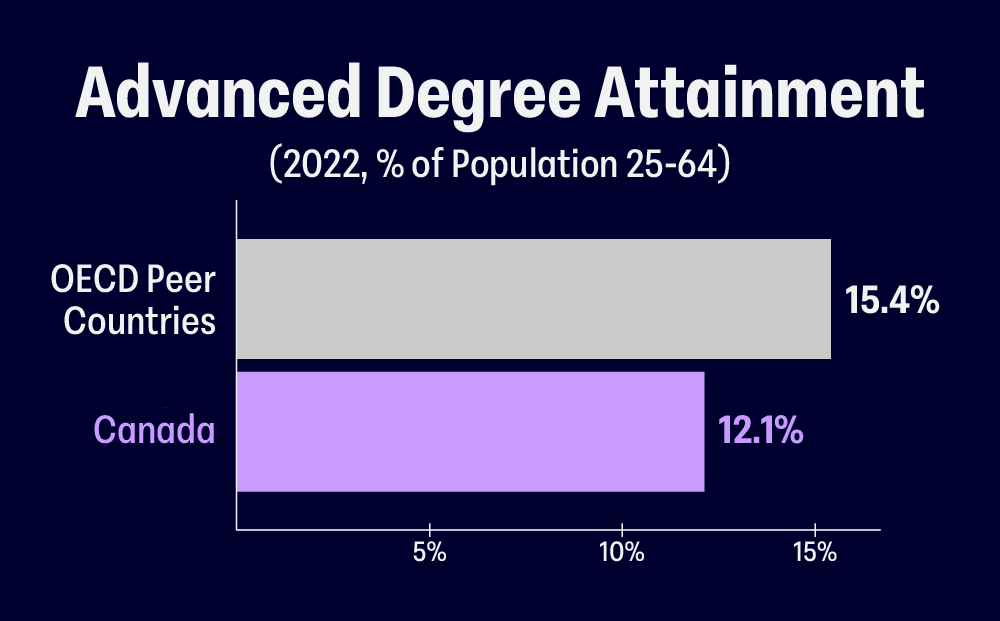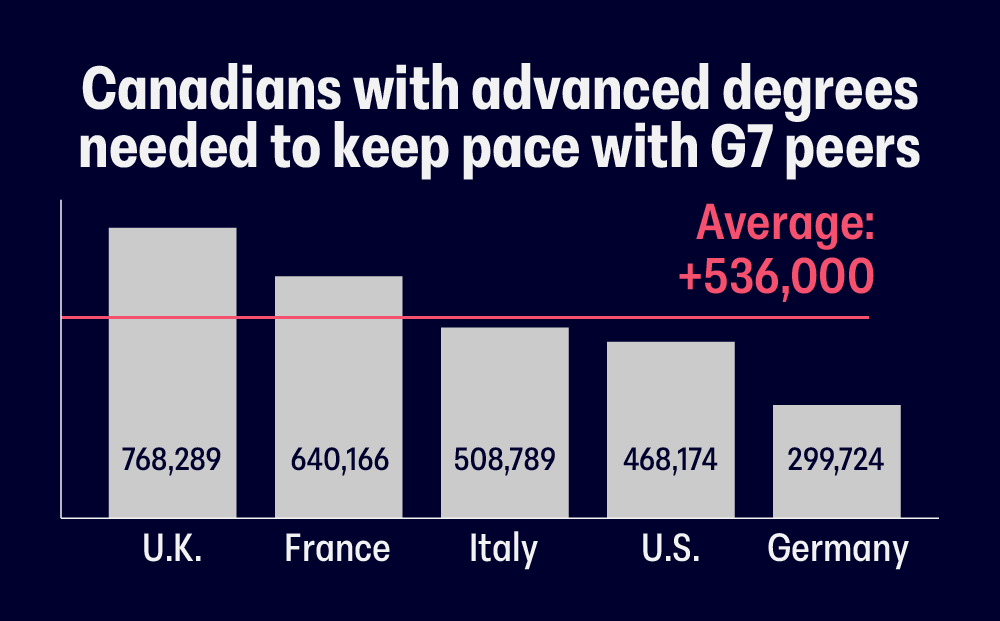Body
I’m writing to share my deep concern about the state of research funding in Canada, and to encourage you to prioritize research funding as part of federal budget 2024 and beyond.
Without a major boost in research funding, Canada’s place as a leader in innovation and home for highly-qualified talent is at stake, and we risk falling badly behind our peers. We must show the same ambition as the United States, Germany and Japan who are significantly increasing research funding.
The talent gap between Canada and its OECD peers continues to grow when it comes to adults with advanced degrees – a 20% increase since 2014. We cannot continue to fall behind in the race for top talent.
Canada’s job market is transforming, with a tremendously high need for highly-qualified talent. In fact, quarterly job vacancies requiring above Bachelor level are up 163% since 2015. Supporting researchers with renewed funding is vital to ensuring Canadian businesses have the talent and knowledge to meet labour needs and grow the economy.
It’s a critical time, and we need to do everything we can to keep Canadian excellence – and Canadian brains – in Canada. Funding research helps develop the cutting edge technologies of tomorrow, medical innovations that save lives, and propels our economy into the future.
Federally funded graduate scholarships have not increased in value in two decades, losing 54% of their value. This makes it harder for Canada to attract and retain talent in a competitive global race and limits access to many promising Canadians with the knowledge we need to get ahead. Now is the time to renew funding support for graduate students and post-doctoral fellows.
The German government has set of goal of spending 3.5% of GDP on research by 2025. The UK speaks of becoming a ‘science superpower’ and the CHIPS and Science Act in the United States has provided a huge boost to funding. Canada should be showing the same ambition and demonstrating the importance of a thriving research ecosystem to all Canadians.
Investing in highly-qualified talent provides long-term returns for Canada and helps Canadians get ahead. In 2020, the average annual earnings in Canada for an individual with an earned doctorate is $100,000, nearly double the Canadian average of $51,950. Let’s support our talent pipeline with adequate support.
Canada is falling behind in the race for talent because we are not funding researchers and graduate students enough. We would need nearly half a million more Canadians with masters or doctoral degrees to be on par with the United States. It is time to start investing in the talent we will need for the future.
Canada needs more highly-qualified talent, with the knowledge and insights to ask big questions and find solutions to pressing challenges like climate change. But stagnant federal funding for research and scholarships is blocking access for far too many Canadians. It’s time to increase funding to reflect the rising affordability challenges researchers are facing.
We need research to develop the solutions to climate change. From wildfires to droughts, Canada is on the frontline of this crisis. Researchers are working on solutions and new technologies, but they need federal support. Stagnant research funding puts the planet at risk.
Tri-council spending on research funding is not keeping pace with inflation. Current spending in 2023/24 was 65% less well controlled for inflation at 2000 prices. That makes it harder for researchers to get the funding for their ideas and afford to stay in the lab with the rising cost of living. We must support our top talent with sufficient funding for their work.
The federal government’s own expert advisory panel agrees that a major increase in funding is needed. The panel recommended an increase in funding for the granting agencies and a long-overdue increase to the value of graduate scholarships and post-doctoral fellowships. Now is the moment to respond to the Bouchard Report and support Canadian researchers.
Canada can be proud of the amazing breakthroughs and ideas that have come from supporting science. But this has been put at risk by a drop in federal funding. Spending on science and technology as a share of total overall federal expenditures has now declined to levels not seen since the mid-1990s at just 3.5%. We must change course and commit to supporting science and research.
















